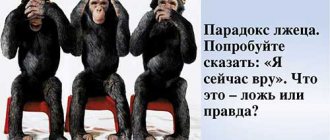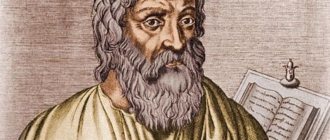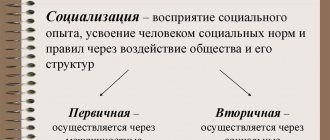An act is a certain action motivated by the inner world of a person formed at that moment. Actions can be moral and immoral. They are committed under the influence of a sense of duty, convictions, education, love, hatred, sympathy. Every society has its heroes. There is also a certain scale by which a person’s actions are assessed. According to it, it is possible to determine whether this is the act of a hero, which will serve as an example for subsequent generations.
Even ancient philosophers thought about the concept of feat. Contemporary thinkers have not escaped reflection on this topic. All human life consists of a continuous chain of actions, i.e. deeds. It often happens that a person's behavior and thoughts differ. For example, a child wishes only the best for his parents. However, their actions often upset them. We can say with confidence that our tomorrow depends on today's actions. In particular, our whole life.
Socrates' Search for the Meaning of Life
Socrates was one of the active seekers of the meaning of this concept. He was trying to figure out what a true heroic act should be. What is virtue and evil, how a person makes a choice - all this worried the ancient philosopher. He penetrated into the inner world of a particular person, his essence. I was looking for a higher purpose for my actions. In his opinion, they should be motivated by the main virtue - mercy.
The basis of actions is the goal of learning to distinguish between good and evil. When a person can penetrate into the essence of these concepts, he will be able, according to Socrates, to always act courageously. Such a person will definitely perform a heroic act for the sake of the greater good. Socrates' philosophical reflections were aimed at finding such an incentive, a force that would not need recognition. In other words, the philosopher is talking about self-knowledge, when a person will have internal motivations that replace centuries-old traditions.
Forms
What are they? The action can be presented in the following forms :
These steps always have a component of meaning. This distinguishes them from reflexive impulses, automatic patterns of behavior.
The latter include conditional “politeness” in behavior , which is often attributed to residents of Europe and America: their behavior is not aimed at giving pleasure to the interlocutor or expressing approval, but is an automated “form” of communication accepted in society.
Thus, the purpose and direction of behavior constitute a significant part of the definition of an action.
The action is also characterized by responsibility . That is, the individual is aware of and accepts the possible consequences. Understanding these processes and vice versa characterizes the personality from the side of consciousness.
They are characterized by feasibility and realism. This means, at least potentially, the possibility of their implementation.
Sophists vs Socrates
The philosophy of Socrates tried to explain the essence of the concept of “action”: what is it? The motivating component of his action is the opposite of the position of the sophists, who teach to find out their hidden motives, giving them the status of conscious ones. According to Protagoras, who was a contemporary of Socrates, the meaning of human life as an individual is a clear and successful expression with the ultimate satisfaction of personal desires and needs.
The Sophists believed that every action of a selfish motive must be justified in the eyes of relatives and other people, since they are part of society. Therefore, the environment needs to be convinced, using sophistic technologies of speech construction, that it is necessary for them. That is, the young man who accepted sophistic views learned not only to know himself, but also, having set a certain goal, achieve it and prove that he was right under any circumstances.
What is it: definition
One of the founders of psychological science, L.S. Vygotsky. defined an act as a form of personal behavior realized during the period of development.
Moreover, the action was not something intuitive or reflexive , but went through all stages of awareness and development of principles of action.
That is, according to Vygotsky, an act is a form of conscious personal behavior.
In the definition of practical psychologist Golovin, an act is an act of a person’s relationship to external phenomena and objects, which is performed consciously and by choice. That is, the action acquires the features of personal self-determination.
In this case, an action can be either successful or unsuccessful , but in both cases it will show a positive result: inaction in this case will not be a failure, since it also expresses a certain attitude towards the world and personality traits.
In the definition of the Oxford scientist Murray, an act is only an element of human behavior. This element signifies a chain of relationships between people and the world around them, a structural component of a more complex pattern of behavior.
In Russian psychology, this impulse is interpreted somewhat more broadly. It represents the core of social activity, which determines the behavior of the individual in society and its main directions.
"Socratic Dialogue"
Socrates departs from the earthly. He rises higher in considering such a concept as an act. What is it, what is its essence? This is what the thinker wants to understand. He seeks the meaning of all human existence, starting from the physical and selfish. Thus, a complex system of techniques is developed, which is called “Socratic dialogue”. These methods lead a person along the path of knowledge of the truth. The philosopher leads the interlocutor to understand the deep meaning of masculinity, goodness, valor, moderation, virtue. Without such qualities, an individual cannot consider himself a human being. Virtue is the developed habit of always striving for good, which will form the corresponding good deeds.
Vocabulary to describe character
There are many adjectives that can help describe a person's character. Here is a detailed list:
Description of a positive hero
- adaptive;
- ambitious;
- vigilant;
- fearless,
- lively;
- inspired;
- thoughtful;
- generous;
- attentive;
- brilliant;
- flexible;
- marvelous;
- Kind;
- quick-witted;
- soulful;
- natural;
- cheerful;
- funny;
- provocative;
- ideological;
- imposing;
- sincere;
- competitive;
- constructive;
- communicable;
- correct;
- curious;
- loving;
- casual;
- spiritual;
- optimistic;
- truthful;
- attractive;
- versatile;
- quick-witted;
- talented;
- creative;
- balanced;
- charismatic;
- neat;
- sensual;
- emotional;
- vigorous;
- erudite;
- bright.
Adjectives for negative characteristics
- gambling;
- greedy;
- immoral;
- apathetic;
- asocial;
- weak-willed;
- illiterate;
- ruthless;
- indifferent;
- suggestible;
- silly;
- dramatizing;
- bad;
- rough;
- snide;
- greedy;
- hard;
- envious;
- snickering;
- closed;
- boring;
- ordinary;
- perverted;
- selfish;
- crooked;
- mercantile;
- suspicious;
- indecisive;
- embittered;
- frenzied;
- tight-fisted;
- absent-minded;
- arrogant;
- quirky;
- boorish;
- cynical;
- misanthropic;
- snobby;
- selfish;
- self-centered;
- eccentric;
- holy fool;
- sarcastic.
Neutral adjectives
- adventurous;
- altruistic;
- ambivalent;
- apolitical;
- ascetic;
- susceptible;
- contactless;
- careless;
- mediocre;
- talkative;
- susceptible;
- impressionable;
- sad;
- confiding;
- dramatic;
- pensive;
- improvising;
- ironic;
- frantic;
- gentle;
- frivolous;
- hypocritical;
- flattering;
- mannered;
- large-scale
- many-sided;
- silent;
- illegible;
- frank;
- desperate;
- principled;
- uninhibited;
- fussy;
- temperamental;
- vulnerable;
- phlegmatic;
- tenacious;
- eccentric;
- prim;
- spectacular.
Vice and driving force
The opposite of virtue is vice. It shapes a person’s actions, directing them towards evil. In order to establish himself in virtue, a person must acquire knowledge and acquire prudence. Socrates did not deny the presence of pleasures in human life. But he denied their decisive power over him. The basis of bad actions is ignorance, and the basis of moral actions is knowledge. In his research, he analyzed a lot of human action: what is its driving force, motive, impulse. The thinker comes close to the Christian views formed later. We can say that he deeply penetrated into the human essence of man, into the concept of the essence of freedom of choice, knowledge, prudence and the origin of vice.
Kinds
Actions are influenced by social norms, family traditions, and personal attitudes.
In its development, an action goes from a mental representation to implementation by action .
At the same time, not all actions end with this action; for various reasons, the action can “break off” in the middle of the path. Such unfinished actions form the basis for the formation of personal dissatisfaction and are subject to careful psychological analysis.
The expected steps are also highlighted . Certain social roles: in the family, in the work team, in personal relationships impose certain expectations from activities. This also includes gender distribution of roles. From here, expected and unexpected actions are distinguished.
There are characteristic and uncharacteristic manifestations for a person, depending on the type of character, age, and gender.
For example, it is typical for a schoolchild to act quickly and rashly, while in adulthood this is a manifestation of infantility. That is, a certain set of actions characterizes the stage of personality development.
According to the degree of responsibility, such activities are divided into responsible and irresponsible. The main criterion is awareness of the consequences and interaction with them.
As a rule, this is associated with certain difficulties in implementation, hence irresponsible actions are much more common.
They also characterize the degree of maturity of the individual .
The concept of responsibility includes both awareness of one’s actions, anticipation of the situation, and the ability to make decisions in these situations.
Responsibility of actions is of great importance in work teams for managers and in family relationships for men. These categories of people are expected to take responsible steps.
From the point of view of morality and morality, they are divided into moral and immoral. Immoral acts form the basis of deviant behavior and are condemned not only by society, but, as a rule, by the law.
The interpretation of the concept of morality is dynamic - for example, the sharp condemnation of premarital relations in Tsarist Russia and freedom of choice in modern society.
However, some aspects remain more conservative in certain segments of the population, as well as ethnic groups.
Aristotle's view
Aristotle criticizes Socrates. He does not deny the importance of knowledge for a person to always do good deeds. He says that actions are determined by the influence of passion. Explaining this by saying that often a person who has knowledge acts badly, since feeling prevails over wisdom. According to Aristotle, the individual has no power over himself. And, accordingly, knowledge does not determine his actions. In order to perform good deeds, a person needs a morally stable position, his volitional orientation, and a certain experience acquired when he experiences sorrow and receives pleasure. It is grief and joy that, according to Aristotle, are the measure of human actions. The guiding force is the will, which is formed by the freedom of choice of a person.
The guy returned the extra 200 thousand rubles to the bank
0
At the beginning of January in Chelyabinsk, Artem Mikheev, due to a cashier’s error, received twice as much money from the bank as he was entitled to. Instead of 200 thousand rubles, the young man was given 400 thousand. Artem found the extra money at home, but he returned to the bank to return 200 thousand to the cashier. The guy commented on his action like this: “I didn’t want to profit from someone else’s grief.”
Measure of actions
He introduces the concept of the measure of actions: lack, excess and what is between them. It is by acting according to the patterns of the middle management, the philosopher believes, that a person makes the right choice. An example of such a measure is masculinity, which falls between such qualities as reckless courage and cowardice. He also divides actions into voluntary, when the source lies within the person himself, and involuntary, forced by external circumstances. Considering the action, the essence of the concept, the corresponding role in the life of a person and society, we draw some conclusions. We can say that to a certain extent both philosophers are right. They looked at the inner man quite deeply, avoiding superficial judgments and searching for the truth.
A correspondent and his daughter were rescued near Lugansk
0
Alina Smelaya, a people's correspondent in Lugansk, was driving home to Lugansk with her daughter at night along a snowy road. The car skidded and ended up in a ravine. A family who was passing by in a minibus came to the rescue. People called for help and, together with the woman, began to wait for rescuers to arrive. Rescuers pulled out the car, but they refused financial assistance.
Kant's view
Kant made a significant contribution to the theory that considers the concept of action and its motivation. He talks about the need to act in such a way that you can say: “Do as I do...”. By this he emphasizes that an act can be considered truly moral when the motivation is free morality, sounding in a person’s soul like an alarm bell. Historians of philosophy believe: human actions and their motives are determined by Kant, from the point of view of rigorism.
For example, considering the situation with a drowning person, Kant argues: if a parent saves his child, this act will not be moral. After all, it is dictated by a feeling of natural love for his own heir. A moral act will be if a person saves a drowning man unknown to him, guided by the principle: “Human life is the highest value.” There is another option. If an enemy was saved, this is a truly moral heroic act worthy of high recognition. Subsequently, Kant softened these concepts and combined in them such human motives as love and duty.
The mongrel protected a 2-year-old boy
0
At the end of autumn in the Moscow region, a large dog attacked a mother who was walking with her small child. A small mongrel tried to save people by entering into battle with an enemy whom she could not defeat. The savior was wounded, but out of gratitude the woman turned to animal rights activists and, after telling this story online, began collecting money for the treatment of the animal. Now they are looking for an owner for the dog.
×
0
In the Urals in the middle of this month, Sergei Frolov, a former traffic police officer, was driving his car when suddenly he saw a little girl on the road. Sergei saved a three-year-old child from an approaching GAZelle. Then the mother of the lost three-year-old Vera was found.
Relevance of the concept of action
The concept of good deeds continues to be discussed today. How often does society recognize as moral the actions of great people, the motive of which in fact was not at all good goals. What is heroism and courage these days? Of course, to save a person or animal from death, to feed the hungry, to clothe the needy. Even the simplest action can be called a real good deed: advice to a friend, help to a colleague, calling your parents. Taking an old woman across the road, giving alms to a poor man, picking up a piece of paper on the street are acts that also fall into this category. As for heroism, it is based on sacrificing one’s life for the benefit of others. This is, first of all, the defense of the Motherland from enemies, the work of firefighters, police, and rescuers. Even an ordinary person can become a hero if he rescued a baby from a fire, neutralized a robber, or covered with his chest a passerby at whom the barrel of a machine gun was aimed.
According to many psychologists, philosophers and theologians, until the age of seven, a child is not able to fully distinguish between good and evil. Therefore, appealing to conscience is useless, due to the fact that the concept for it has very blurred boundaries. However, from the age of seven, he is a fully formed personality who can already consciously make a choice in one direction or another. The actions of children at this time must be skillfully directed by their parents in the right direction.
When you do wrong
Forgot to congratulate a loved one on the holiday
To be honest, each of us sometimes forgot to congratulate a friend on his birthday, his parents on his wedding anniversary, and his other half on the day we met. The stronger half of humanity most often suffers from such forgetfulness, although, for sure, many ladies have found themselves in a similar situation.
It seems that there is nothing wrong with this: you can call the next day, apologize, citing a bunch of things to do. However, you should never justify your forgetfulness with actions.
. You might be surprised to see how touchy people you know can be!
If you try to refer to deeds, the person whom you did not congratulate may decide that your deeds are more important than his joyful event, which you simply had to remember! Usually with such forgetfulness a wall is built
, which arises between old friends who are forced to communicate quite rarely.
How to remember to congratulate a loved one on the holiday?
But there are situations when you deliberately did not want to congratulate someone for the reason that this someone forgot to congratulate you. This happens quite often. But think about it: is the forgetfulness of your loved one or acquaintance worth it to show such petty vindictiveness? However, most often we simply forget about the need to congratulate...
To avoid getting into such an awkward situation, use a few minutes of free time and enter all the important dates
, with which you should congratulate your loved ones, in the organizer of your phone or computer. This will prevent you from feeling guilty and apologizing for your forgetfulness.
Got drunk at a corporate party
Let's be honest - we love to go for a walk. I especially want to relax after a hard day at work. And it would be a sin not to do this if the management itself organizes a corporate holiday, which is designed to unite the team together, to give all employees the opportunity to feel like one big friendly family.
This is, of course, a good thing, but for some of its participants a corporate party can turn from a holiday into a real hell
, after which it is embarrassing not only to appear in front of your colleagues, but even to look at yourself in the mirror. And how many family scandals have resulted from such gatherings!
The reason why people get drunk at corporate events is clear. Sometimes tension in a team can be relieved only with the help of a fair amount of alcohol. And when dancing on the table or hugging the toilet starts (or someone just ends up face-first in the salad), someone from the “support group” will definitely be nearby with their mobile phone camera turned on.
How can you look your colleagues in the eyes without shame after a corporate party?
Finding yourself a YouTube star in such a situation is something few people smile at. What to do to avoid losing face in front of the team?
, and then not be painfully ashamed of a few hours of euphoria? Don't go to corporate events? Not an option.
The first step is to objectively assess your drinking capabilities. If alcohol is not your thing, you should either not drink at all (which not everyone does), or choose one drink and under no circumstances change it throughout the evening.
Never lose sight of your glass or shot glass. Enterprising colleagues, knowing your intolerance to alcohol, may, for example, add vodka to your champagne
, in anticipation of the performance that might follow.
Talk to a colleague who can be trusted with your honor and conscience. Let him or her keep an eye on you and, if you have had too much, try to send you home in a taxi as quickly as possible, giving you the opportunity to avoid continuing the banquet. The main thing is that the colleague is reliable, otherwise soon the two of you will be filmed dancing on the table.
Unconscious actions
To answer the question of what actions are, one should compare a thinking being and an animal governed by instinct.
Every living creature does something during its life. It moves, eats, breathes, sleeps, relieves itself, produces offspring. Animals are driven to do this by instinct. The same thing happens with very young children - with the exception of the reproduction of their own kind, the actions of a child and an animal are identical. These actions rarely fall into the category of deeds. After all, they are connected with vital necessity.
Do good and...throw it into the sea!
There are good deeds and bad ones. Usually good people are those who make others around them feel better. We often see examples of actions that fall into this category in everyday life.
A boy gave up his seat on the bus to an elderly woman, a man returned extra money to the seller, mistakenly withdrawn from a large bill, a grandmother took food to stray cats on the street - the list goes on and on! Even the usual routine phrase addressed to an old neighbor: “How is your health?” — can rightfully be included in the “Good Deeds” list. After all, what is important is not how many resources, effort and time a person spent on a good action, but what goal he pursued and what the result of his deed was.











